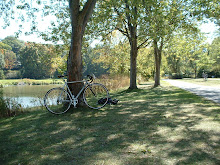I bought my brother-in-law a book by Alisa Smith and J.B. MacKinnon called The 100 Mile Diet: A Year of Local Eating. I was leafing through it this morning, and came across a few interesting things:

One thing I learned was that the University of British Columbia, in downtown Vancouver, operates a community farm!
The Farm is a student-driven initiative where students, faculty, staff, and the local community have been working together to create a place where anyone can come to learn, live and value the connection between land, food and community.
The UBC Farm is a 24 hectare teaching, research, and community farm located on the University of British Columbia's Campus in Vancouver, Canada. As the only working farmland within the city of Vancouver, the UBC Farm is an urban agrarian gem, featuring a landscape of unique beauty.
That is so cool. I'm going to push for my university's new campus to have a community farm!!!
I also found a couple interesting facts about food industrialization: although it is ironic enough that industrial agriculture sprang out of World War Two military innovations, and while we know that, on many fronts, industrial agriculture is ruinous for the planet (especially the meat industry), did you more specifically know the following?
a) due to the industrial farm movement, and the "which crop will make me the most money?" thought-process, of the 463 varieties of radish indexed by the U.S. Department of Agriculture in the early 20th century, 436 of them are now extinct?!!?
b) Twenty species of plant account for 90% of the food consumed in the world!! (If you read this book though, and learn what we've done with soy and corn, this isn't actually that surprising).
Aside from those neat facts, there are some thoughts about being vegetarian while trying to eat locally, and what you do for protein when you can not find a supply of chick peas, lentils and tofu within a 100 mile radius. I won't tell you what answers they found to this problem, but I am going to repeat some of their reasons for being vegetarian - familiar enough to anyone reading this blog, but well enough written to bear repeating:
"The decision (to go veggie) was not rooted in any unusual squeamishness about killing animals. What we chose to reject was our species' capacity to disregard life... We never will accept the idea that animals can be treated like machines that produce meat, milk, and eggs. We are equally troubled by the fact that meat production monopolizes the world's scarce agricultural land. It takes fourteen pounds of corn for a cow to gain one pound of edible meat - a fattening technique developed by industrial feedlots that goes against cows' biology; they evolved to eat only grasses. Meanwhile, cows and other livestock hog half the corn grown in America, while 800 million people go hungry worldwide."
To everyone eating tofu and chick peas this holiday season, have a great Christmas!!!!

5 comments:
Merry Christmas to you Tuco! I've temporarily dropped off the face of the Earth, but I am planning a comeback in the new year!
Merry Christmas! Sounds like a great book - I might just have to check it out.
It is pretty incredible to consider how much food it takes to "grow meat." The local food movement where I live is heavily meat-centered, and somewhat frustrating to me. Luckily, I do have access to locally grown/made tofu & soy milk, etc.
So depressing I can hardly read your overview, much less the actual book.
The Smudgemo family Christmas dinner:
Appetizer - Spicy crab chilled pea-shots
Salad - Warm radicchio & frisee with goat cheese, toasted hazel nuts with a balsamic reduction
Main - Deconstructed Lasagna with fresh pasta sheets, chanterelle mushroom bechamel, roasted winter squash and mascarpone filling
Side- Slow roasted tomatoes dressed in rosemary and garlic
So the crab was not vegetarian and probably not local due to the oil spill, but there was only a small amount for each of four people. The cheese was probably not local, but again, there wasn't a lot used. Most of the whole ingredients were from the local farmer's market and were carried home by bike.
Not 20th century North American traditional, but damn tasty and a fraction of the global damage.
Happy holidays, Tuco!
I hope you had a nice Christmas.
I've been meaning to read this book for some time, but I thought it might be too difficult for a vegan to survive. Probably not. I make a pretty good effort to eat locally. Our local organic food box delivery program (SPUD) highlights all of the local produce and products to make it easier to purchase locally grown foods. Also Capers (a Whole Foods type place) labels all local products.
I've been to the UBC community garden and it is beautiful. I can't think of anything they weren't growing there including a great variety of fruit. There is also a separate herb garden for medicinal and culinary uses that is quite lovely.
Post a Comment